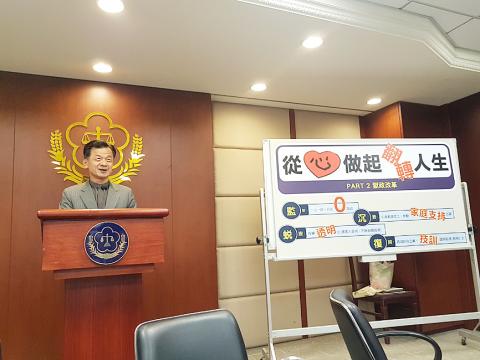The Ministry of Justice yesterday said that it was considering changes to prison policies, especially those regarding inmates’ families, to better rehabilitate prisoners and facilitate their reintegration into society after their release or parole.
The possible reforms include changes to prison facilities, making the parole process more transparent, introducing familial support, increasing the number of rehabilitation volunteers and helping inmates gain skill certificates, Minister of Justice Chiu Tai-san (邱太三).
Agency of Corrections Director Huang Chun-tang (黃俊棠) said overcrowding in prisons would be addressed by expansion projects for Taipei Prison, Taoyuan Prison, Second Yunlin Prison and Bade Prison in Taoyuan.

Photo: Chien Lee-chung, Taipei Times
The expansions are to accommodate a total of 4,755 prisoners in 2.31m2 cells with individual beds, he said.
Taipei Prison has 51 cellblocks, each about 19m2 to 26m2, meaning that with 16 inmates per block, each prisoner has only 1.65m2 of space, Huang said.
The expansion projects aim to eliminate overcrowding in prisons for at least four years, Chiu said.
More volunteers would be sought to carry out and improve the efficiency of individual and group rehabilitation efforts, the Ministry of Justice said.
In an effort to maintain familial relations — a key component to aid the reintegration of inmates into society — the ministry is to launch a project in which prisoners record stories for their children aged six or younger, it said.
The recordings would be made available for inmates’ family members and social welfare groups to help children cope with their fathers not being present, the ministry said, adding that the program would later be expanded to female inmates.
A number of academics and experts have been consulted in the drafting of new parole approval criteria, Chiu said.
The severity of the crime, the risk of an inmate repeating the offense and their attitude and performance during imprisonment are to be factors taken into consideration when parole applications are reviewed, he said.
The ministry said it is considering turning the current review method — in which victims and general members of the public are asked to review parole applications — into an alternative process, in which victims and social representatives would be asked to weigh in on applications via telephone or video conference.
The ministry is to allocate NT$70 million (US$2.3 million) annually to the corrections agency to have companies and organizations, such as Formosa Plastics Group (台塑集團) or Rotary International, offer courses at the prison or at alternative locations, it said.
The courses would cover more than 26 specialties, including stacker operation, baking, carpentry, pottery, electrical wiring and digital drawing, to teach inmates skills they could use to find employment upon their release or parole, the ministry said.
Correctional facilities must not only render just punishment to those who have broken the law, but also proactively re-educate them and ensure their smooth reintegration into society, Chiu said.

SECURITY: As China is ‘reshaping’ Hong Kong’s population, Taiwan must raise the eligibility threshold for applications from Hong Kongers, Chiu Chui-cheng said When Hong Kong and Macau citizens apply for residency in Taiwan, it would be under a new category that includes a “national security observation period,” Mainland Affairs Council (MAC) Minister Chiu Chui-cheng (邱垂正) said yesterday. President William Lai (賴清德) on March 13 announced 17 strategies to counter China’s aggression toward Taiwan, including incorporating national security considerations into the review process for residency applications from Hong Kong and Macau citizens. The situation in Hong Kong is constantly changing, Chiu said to media yesterday on the sidelines of the Taipei Technology Run hosted by the Taipei Neihu Technology Park Development Association. With

CARROT AND STICK: While unrelenting in its military threats, China attracted nearly 40,000 Taiwanese to over 400 business events last year Nearly 40,000 Taiwanese last year joined industry events in China, such as conferences and trade fairs, supported by the Chinese government, a study showed yesterday, as Beijing ramps up a charm offensive toward Taipei alongside military pressure. China has long taken a carrot-and-stick approach to Taiwan, threatening it with the prospect of military action while reaching out to those it believes are amenable to Beijing’s point of view. Taiwanese security officials are wary of what they see as Beijing’s influence campaigns to sway public opinion after Taipei and Beijing gradually resumed travel links halted by the COVID-19 pandemic, but the scale of

A US Marine Corps regiment equipped with Naval Strike Missiles (NSM) is set to participate in the upcoming Balikatan 25 exercise in the Luzon Strait, marking the system’s first-ever deployment in the Philippines. US and Philippine officials have separately confirmed that the Navy Marine Expeditionary Ship Interdiction System (NMESIS) — the mobile launch platform for the Naval Strike Missile — would take part in the joint exercise. The missiles are being deployed to “a strategic first island chain chokepoint” in the waters between Taiwan proper and the Philippines, US-based Naval News reported. “The Luzon Strait and Bashi Channel represent a critical access

Pope Francis is be laid to rest on Saturday after lying in state for three days in St Peter’s Basilica, where the faithful are expected to flock to pay their respects to history’s first Latin American pontiff. The cardinals met yesterday in the Vatican’s synod hall to chart the next steps before a conclave begins to choose Francis’ successor, as condolences poured in from around the world. According to current norms, the conclave must begin between May 5 and 10. The cardinals set the funeral for Saturday at 10am in St Peter’s Square, to be celebrated by the dean of the College